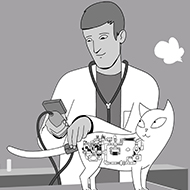Vets urged to offer feline blood pressure checks

More than 40 per cent of cats enrolled in Ceva Animal Health's Mercury Challenge were hypertensive.
Ceva Animal Health is calling on veterinary practices to offer feline blood pressure checks as part of a UK-wide testing and awareness event.
The ‘Know Your Numbers’ Campaign takes place 6-12 September, and veterinary professionals are being urged to focus on the importance of feline blood pressure checks amongst cat owners whose pets are seven years of age and older.
It comes after Ceva Animal Health’s Mercury Challenge revealed that more than 40 per cent of cats enrolled in the initiative were hypertensive, with a blood pressure about 30 per cent higher than the blood pressure value found in healthy cats. The mean age of hypertensive cats was found to be 13 years old.
To help generate conversations between veterinary professionals and cat owners, CEVA has put together some ‘Know Your Numbers Week!’ facts, which include:
- It is estimated that one in five cats from nine years of age may suffer from high blood pressure, many of which are undiagnosed.
- Four organs may be damaged due to high blood pressure in cats – eyes, brain, kidneys and heart.
- A cat is generally thought to be hypertensive when its systolic blood pressure is above 160mm Hg1.
- Best practice is to discard the first blood pressure reading and then take the average systolic blood pressure from five further readings.
Nicki Glen, marketing project manager at Ceva Animal Health, said: “Know Your Numbers Week! is a fantastic opportunity to raise awareness of the risks of feline hypertension, which is known as the ‘silent killer’ as it often develops insidiously without any early signs, and the importance of regular blood pressure checks in cats seven years of age and older to help detect, treat and control the condition."
Ceva's initiative coincides with the human health campaign, which has been running for 21 years.



 The Veterinary Medicines Directorate (VMD) is inviting applications from veterinary students to attend a one-week extramural studies (EMS) placement in July 2026.
The Veterinary Medicines Directorate (VMD) is inviting applications from veterinary students to attend a one-week extramural studies (EMS) placement in July 2026.